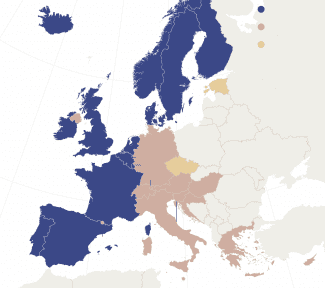Before marriage equality was made legal last year in all 50 United States last by the SCOTUS ruling, more and more states were fighting for and winning marriage equality on their own. The movement was happening, but the SCOTUS ruling was just what humanity needed.
The pattern has been occurring across Europe as well. Progress has been made in most of the western European nations, but one major bump in the road remains and seems it will remain for some time. Why is Germany holding out on marriage equality? Is it politics or just one person's belief?
Across Western Europe, marriage equality is fast becoming the norm: From Scandinavia through the Netherlands and Denmark; even the Catholic countries of Ireland, France and Spain. But there’s one glaring exception: Germany. It stands out not only because it is the largest country in Western Europe, but also because on many measures, it is among the most progressive.
Germany’s outlier status (it allows “registered partnerships,” but not full marriage) is even more curious because much of the country is in favor. But not its leadership: Chancellor Angela Merkel and her party, the Christian Democratic Union, have stood athwart the Continentwide movement and yelled no.
Part of the reason is personal: Ms. Merkel, the daughter of a Protestant pastor, grew up in the former East Germany, where Communism and traditional social mores reinforced the power of the state, and she admits to being extremely conservative on this issue. She has budged on gay rights issues only when forced to do so by the Constitutional Court. – nytimes.com
Alexander Görlach (visiting scholar at the Center for European Studies at Harvard) continues in his New York Times piece to discuss Merkel's opposition not just to marriage equality, but also to adoption rights of gay couples, and her support among Germany's older conservative voters who like her statement that there will be no gay marriage in Germany as long as she is in office. Does she believe that the nation will not budge on the topic so she won't and therefore doesn't desire to waste any time on the matter? Görlach does site that the xenophobic, anti-refugee feelings growing in the nation may be clouding the waters altogether, making more people accepting of conservative ways.
Head over to the NYTimes.com where the article brings into light the left-wing Social Democrats, the Christian Social Union (C.S.U.), and more about the Christian Democratic Union (C.D.U.).
Traditionally, it is the Protestant countries of the north that have led on progressive social issues, with the Catholic south dragging behind. This time, though, it is Germany, the leading country in Protestant Europe, that lags the rest. Without a major realignment in German politics, that is unlikely to change for a long time to come.
h/t: nytimes.com




